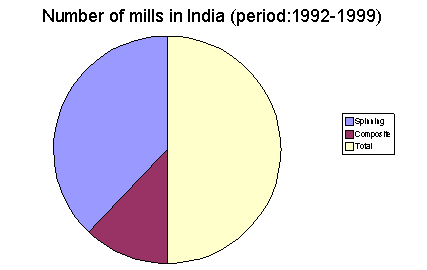Textile Mills
Please note that we are not authorised to provide any investment advice. The content on this page is for information purposes only.
Introduction
Textile Mills in India are the manufacturing plants for producing woven textile fabrics and related products. Textile mill industry can be recognized as one of the largest industries in India, providing employment to about 10 lakh workers. Major textile products manufactured by textile mills include yarn products, cotton yarns, blended yarn, synthetic yarn, specialty yarn, fabric products, woven fabrics knitted fabrics, woolen and acrylic blankets, blazer cloth, tweed and all kinds of woolen cloth.
Major activities of textile mills in India include weaving, knitting, knotting, crocheting and pressing the fibers.
For the last couple of years, Indian textile mills are experiencing tremendous growth.
Present scenario of Indian Textile Mills
Most of the textile mills in India are not at all technologically updated. Some of the major problem associated with these mills include low productivity, increase in cost input, inadequate working capital, and stagnation in demand.
Measures
Government of India has initiated some strategies and planning to reconstruct textile mills in India. BIFR ( Board for industrial and Financial Reconstruction ) was set up to identify the reasons behind the sickness of these mills. Textile Workers’ Rehabilitation Fund Scheme (TWRFS) was also set up to undertake these problems.
Leading Indian Textile Mills
Some of the leading Textile Mills in India include
Adarsh Textile Mills : Manufacturer and exporter of good quality woolen and synthetic blankets
Amritsar Swadeshi Woolen Mills : Pioneer in manufacturing heavy woolen yarn and largest manufacturer of fabric
Aroon Mills : Manufacture of textile auxiliaries
Mohan Thread Mills : Manufacturer of high quality embroidery yarn and threads
Market estimation
In 1997, the overall Indian market for the textile machinery was approximated at USD 895 million and was estimated to grow at an average annual growth rate of 6%.
Factors responsible behind the growth of textile machinery in India
Some of the major factors responsible behind the growth of textile machinery sector are:
Figure and facts about textile mills in India
In 1999, the total number of cotton or man-made fiber textile mills were 1788. out of that, 92 mills were in the public sector, 152 in the co-operative sector and the rest 1444 were in the private sector. India has about 34 million cotton textile spindles for manufacturing cotton yarn.
the above chart depicted above, it is seen that Spinning captures the maximum number of mills.
Leading Textile mills in India
Some of the major textile mills in India are:
Product range
Some of the major products produced by textile mills in India are gazed and mercerized yarns, sewing threads, crochet and hand knitting yarns, industrial threads, yarn, grey woven fabric, dyed woven fabrics, grey knitted fabric, dyed knitted fabric, and garments like long coat, pant, shirt, bib pant, jacket coat and many more.
Activities of textile mills in India
Major activities involved in textile mills in India include back processing, spinning, twisting, knitting, and processing.





